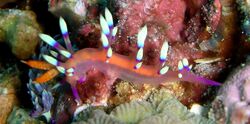Biology:Coryphellina marcusorum
| Coryphellina marcusorum | |
|---|---|

| |
| Coryphellina marcusorum | |
| Scientific classification | |
| Kingdom: | |
| Phylum: | |
| Class: | |
| (unranked): | clade Heterobranchia
clade Euthyneura clade Nudipleura clade Nudibranchia clade Dexiarchia clade Cladobranchia clade Aeolidida |
| Superfamily: | |
| Family: | |
| Genus: | |
| Species: | C. marcusorum
|
| Binomial name | |
| Coryphellina marcusorum (Gosliner & Kuzirian, 1990)[1]
| |
| Synonyms | |
| |
Coryphellina marcusorum, (Spanish common name: Eolidáceo de Marcus)[2] is a species of sea slug, an aeolid nudibranch, a marine gastropod mollusc in the family Flabellinidae.[3]
Distribution
This species was described from Isla San Diego, Baja California, Mexico. Coryphellina marcusorum is thought to occur in two disjunct populations in the waters of central and south America: one group on the west coast of central America in the eastern Pacific Ocean[4] and as far east as the Galapagos Islands[2] and the other on the east side of the continent in the Caribbean Sea and in the western Atlantic Ocean down to Brazil.[5]
Description
Coryphellina marcusorum has a mainly translucent pink or orange body colour.[4] The elongate rhinophores, foot corners and cerata are tipped with opaque white (or sometimes opaque yellow), with a broad, purple band beneath. The posterior face of the rhinophores may have up to one hundred papillae.[5] The oral tentacles are elongate and thin, and are longer than the rhinophores.[4]
The maximum recorded body length is 25 mm[6] or up to 30 mm.[4]
This species is very similar in colouration to the recently described African species Coryphellina arveloi.[5] A comparison with other Flabellinidae species from Mexico is given in the description of Orienthella fogata.[4]
| Species | Rhinophores | Ground colour | Colour of cerata | Living size (mm) |
|---|---|---|---|---|
| Coryphellina marcusorum | Red, papillate posteriorly | Bright pink | Pink, purple and yellow | < 20 |
| Samla telja | Yellow or brown, perfoliate | Light pink, white spots | Brownish pink | < 24 |
| Edmundsella vansyoci | Pink, verrucose | Rose pink | Rose pink, white spots | < 15 |
| Flabellina bertschi | White, smooth | White | Reddish pink, white tips | < 8 |
| Orienthella fogata | Translucent orange, annulate | Translucent orange | Red with white spots | < 15 |
| Kynaria cynara | White with purple tips, perfoliate | Pink with purple markings | Salmon & purple, white spots | < 12 |
Habitat
Minimum recorded depth is 3 m.[6] Maximum recorded depth is 22 m.[6]
References
- ↑ Gosliner, T. M. & A. M. Kuzirian. 1990. Two new species of Flabellinidae (Opisthobranchia: Aeolidacea) from Baja California. Proceedings of the California Academy of Sciences, 47: 1-15.
- ↑ 2.0 2.1 "CDF Galapagos Species Checklists - Flabellina marcusorum". Checklists.datazone.darwinfoundation.org. http://checklists.datazone.darwinfoundation.org/marine-invertebrates/mollusca/flabellina-marcusorum-gosliner-kuziriam-1990/. Retrieved 2012-07-05.
- ↑ "WoRMS - World Register of Marine Species - Flabellina marcusorum Gosliner & Kuzirian, 1990". Marinespecies.org. http://www.marinespecies.org/aphia.php?p=taxdetails&id=224326. Retrieved 2012-06-04.
- ↑ 4.0 4.1 4.2 4.3 4.4 Millen S. & Hermosillo A. (2007) The genus Flabellina Voight, 1834 (Mollusca: Opisthobranchia) from Bahia de Banderas (Pacific coast of Mexico) with ecological observations, the description of a new species, and the redescription of Flabellina cynara. Proceedings of the California Academy of Sciences ser.4, 58(26): 543-559. page(s): 556
- ↑ 5.0 5.1 5.2 Rudman, W.B. (September 13, 2000). "Flabellina marcusorum Gosliner & Kuzirian, 1990.". Sea Slug Forum. Australian Museum, Sydney. http://www.seaslugforum.net/factsheet/flabmarc. Retrieved 2015-10-29.
- ↑ 6.0 6.1 6.2 Welch J. J. (2010). "The “Island Rule” and Deep-Sea Gastropods: Re-Examining the Evidence". PLoS ONE 5(1): e8776. doi:10.1371/journal.pone.0008776.
External links
- Photos of Coryphellina marcusorum on Sealife Collection
Wikidata ☰ Q5456561 entry
 |
